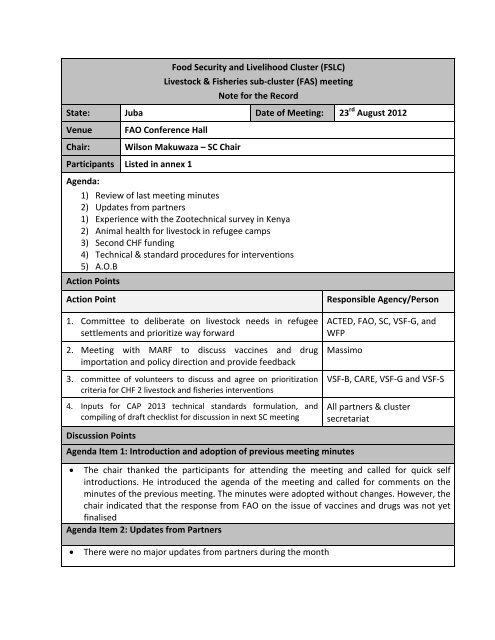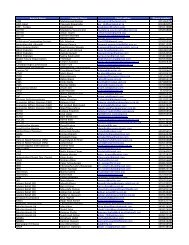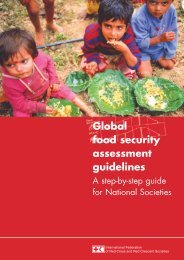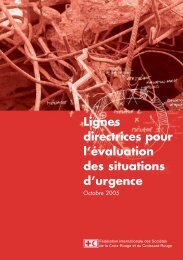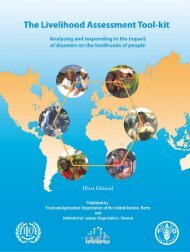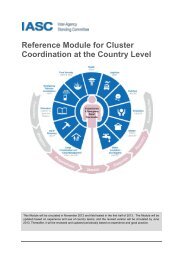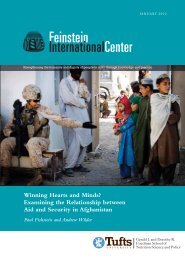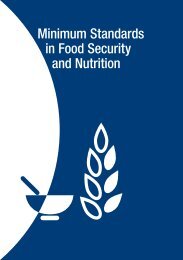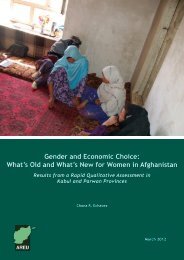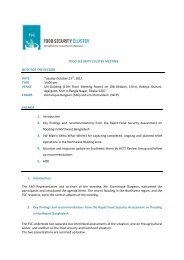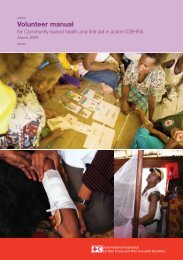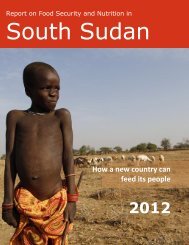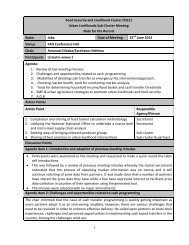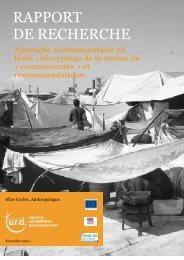Livestock Fisheries SC meeting minutes, 23rd Aug 2012.pdf
Livestock Fisheries SC meeting minutes, 23rd Aug 2012.pdf
Livestock Fisheries SC meeting minutes, 23rd Aug 2012.pdf
Create successful ePaper yourself
Turn your PDF publications into a flip-book with our unique Google optimized e-Paper software.
Food Security and Livelihood Cluster (FSLC)<br />
<strong>Livestock</strong> & <strong>Fisheries</strong> sub‐cluster (FAS) <strong>meeting</strong><br />
Note for the Record<br />
State: Juba Date of Meeting: 23 rd <strong>Aug</strong>ust 2012<br />
Venue<br />
Chair:<br />
FAO Conference Hall<br />
Wilson Makuwaza – <strong>SC</strong> Chair<br />
Participants Listed in annex 1<br />
Agenda:<br />
1) Review of last <strong>meeting</strong> <strong>minutes</strong><br />
2) Updates from partners<br />
1) Experience with the Zootechnical survey in Kenya<br />
2) Animal health for livestock in refugee camps<br />
3) Second CHF funding<br />
4) Technical & standard procedures for interventions<br />
5) A.O.B<br />
Action Points<br />
Action Point<br />
1. Committee to deliberate on livestock needs in refugee<br />
settlements and prioritize way forward<br />
2. Meeting with MARF to discuss vaccines and drug<br />
importation and policy direction and provide feedback<br />
3. committee of volunteers to discuss and agree on prioritization<br />
criteria for CHF 2 livestock and fisheries interventions<br />
4. Inputs for CAP 2013 technical standards formulation, and<br />
compiling of draft checklist for discussion in next <strong>SC</strong> <strong>meeting</strong><br />
Responsible Agency/Person<br />
ACTED, FAO, <strong>SC</strong>, VSF‐G, and<br />
WFP<br />
Massimo<br />
VSF‐B, CARE, VSF‐G and VSF‐S<br />
All partners & cluster<br />
secretariat<br />
Discussion Points<br />
Agenda Item 1: Introduction and adoption of previous <strong>meeting</strong> <strong>minutes</strong><br />
• The chair thanked the participants for attending the <strong>meeting</strong> and called for quick self<br />
introductions. He introduced the agenda of the <strong>meeting</strong> and called for comments on the<br />
<strong>minutes</strong> of the previous <strong>meeting</strong>. The <strong>minutes</strong> were adopted without changes. However, the<br />
chair indicated that the response from FAO on the issue of vaccines and drugs was not yet<br />
finalised<br />
Agenda Item 2: Updates from Partners<br />
• There were no major updates from partners during the month
Agenda Item 3: Experience with the Zootechnical survey in Kenya<br />
• During the June <strong>meeting</strong> VSF Belgium made a presentation on a Zootechnical tool that was<br />
developed in West Africa for monitoring livestock productivity, performance, and collecting<br />
baseline information. The presentation in June aimed at gathering views from partners before<br />
the tool is applied in east Africa and to assess its potential in South Sudan.<br />
• During the <strong>Aug</strong>ust <strong>meeting</strong> Khang Chol presented the preliminary results of the tool’s<br />
application in a survey conducted in arid and semi‐arid lands of northern Kenya in Samburu,<br />
Turkana, Pokot, Marsabit, Garissa, Wajir and Mandera counties. The survey was conducted<br />
through a consortium of agencies comprising Oxfam GB as the lead NGO, ACTED, VSF‐B, VSF‐<br />
CH, VSF‐Germany, and Project ECHO Lanina II.<br />
• Khang reported that the survey methodology comprised the following steps:<br />
1) Sites selection under the guidance of the host organization at local level while target<br />
areas within each County were selected based on high number of goats and<br />
households that benefitted from the ECHO Lanina II project<br />
2) Sample size calculation based on the number of beneficiaries per location<br />
3) Identification of respondents by the host organization taking into consideration the<br />
modalities generated by the consultants.<br />
4) Communities mobilization by the host organization with the involvement of<br />
community leadership; taking into consideration gender aspects for fair<br />
representation; and informing livestock keepers (LKs) of the requirements to<br />
participate in the survey i.e. not having more than 30 goats, and with a good<br />
knowledge of the livestock history over the last 1 year.<br />
• Khang noted that at the start of the survey it was challenging. This resulted from the fact that<br />
the tool was being used for the first time in East Africa and was therefore new to both the<br />
host organizations and the communities. The 1 year recall period was also long for some<br />
households to effectively remember the history of the flock; and there were variation in<br />
number of seasons between semi‐arid and arid. While the survey was planned taking into<br />
consideration 4 seasons, some semi‐arid zones had up to 5 identified seasons. The implication<br />
of this being that since the survey team used pictorial evidence of the four seasons to collect<br />
information from respondents they lacked evidence for the additional season reported in<br />
some semi‐arid areas.<br />
• Despite the challenges encountered Khang was positive that the tool generated some<br />
promising results and it has the potential for application in South Sudan to estimate mortality<br />
among goats. He however reiterated that it would require adjustments for application in<br />
collecting data about other livestock categories.<br />
• He indicated that the preliminary/draft report is not yet ready but will be shared once<br />
finalized.
Agenda 4: <strong>Livestock</strong> health in refugee camps<br />
• The influx of refugees from Sudan into Maban County in Upper Nile state together with their<br />
possessions has led to livestock concentration around camps.<br />
• In <strong>Aug</strong>ust 2012 CESVI conducted an assessment of livestock situation in Yousif Batil refugee<br />
camp (for refugees from Blue Nile state) based on random sampling from 88 refugee and 20<br />
host households. The findings were presented to the <strong>meeting</strong> by Fabrizio Vitale, a Project<br />
Coordinator at CESVI for discussions and the way forward.<br />
• The assessment identified there are more than 104000 heads of livestock in the camp most of<br />
them (92%) owned by refugee households as opposed to 8% by host community.<br />
• The assessment identified a number of concerns that include the imbalance between<br />
livestock owned by refugees and host community and the consequent competition over<br />
resources that would trigger conflicts; high generation of waste that is not properly managed<br />
in the camp with possible impacts on water and hygiene conditions; and high livestock<br />
mortalities whose carcases are not properly disposed. The assessment estimated that 31,052<br />
heads of livestock died in the last 3 months and there are possibilities of livestock‐human<br />
disease transmission since disease control interventions are minimal.<br />
• The survey further identified high selling of livestock among host community households<br />
compared to those of refugees which may partly signal declining coping strategies. In<br />
response, Massimo cautioned against such conclusions especially if not well supported by<br />
evidence. He clarified that selling of livestock can only be considered a deteriorating coping<br />
strategy if sales are happening against declining prices or deteriorating terms of trade.<br />
Otherwise, sales may be driven by favourable market conditions elsewhere.<br />
• CESVI further reported that the number of partners undertaking livestock interventions is not<br />
adequate considering the livestock population in Maban County. There is urgent need to<br />
scale up.<br />
• Similar findings had been identified through an assessment by Save the Children in February<br />
2012. More so the February assessment identified high malnutrition rates among children<br />
despite high livestock ownership, which pinpoints the need to re‐think of appropriate<br />
measures to alleviate the situation.<br />
• Massimo informed that while the assessments are raising issues of concern and urgency<br />
especially livestock mortalities in camps there is need to ensure the results are well informed<br />
by evidence. Before prioritising any response action the technical capacity of the intervening<br />
organisation need to be assessed. This is because livestock health is a serious matter that can<br />
only be entrusted to qualified veterinarians. Non‐veterinarian organisations should focus<br />
more on livestock based livelihood activities, awareness creation, digging of pits to dispose<br />
carcasses, and creating awareness on hygienic issues such as meat and milk sourcing and<br />
preparation.<br />
• In order to respond appropriately the <strong>meeting</strong> agreed to constitute a committee of expert<br />
persons to deliberate on the issues identified by the two assessments (CESVI & <strong>SC</strong>) and come<br />
up with detailed programmatic response actions.<br />
• The constituted committee comprising of ACTED, FAO, <strong>SC</strong>, VSF‐G, and WFP decided to meet<br />
on 28 th <strong>Aug</strong>ust to deliberate on response actions and resource needs.
Agenda Item 5: CHF second round of funding<br />
• The cluster coordinator informed the <strong>meeting</strong> that the call for the second round of CHF<br />
funding is in process. This is being undertaken alongside the CAP 2013. He provided the<br />
timeline of events that cluster partners need to be thoroughly informed so that they prepare<br />
adequately.<br />
• The amount available for the second round of funding is about US$30 million catering for all<br />
clusters. This implies that the allocation to each cluster will be low and hence the need to<br />
prioritise what the cluster will undertake.<br />
• He further informed that during the first round of funding needs assessment was undertaken<br />
by the cluster. However, during the second round the cluster has decided that partners<br />
should generate the criteria for identifying needs and prioritising issues to be considered<br />
during the allocation process<br />
• He presented the broad issues that the cluster secretariat feels should direct needs<br />
assessment and prioritisation process by the sub‐clusters. Such include the mostly likely<br />
scenarios in the next 6 months; priority interventions and areas, priority supplies for<br />
interventions and key pre‐positioning areas, operational arrangements and key issues,<br />
priority operational costs, and partnerships between core pipeline and partners. This is to<br />
ensure the cluster own the process and decide on issues that will guide the proposal<br />
development process. This will further minimise the feeling amongst some partners that<br />
supply of inputs was not well prioritised and led to experienced delays in responses.<br />
• Wilson elaborated that although the issue of inputs delivery through the core pipeline remain<br />
contentions and has been criticised, there is need to understand that MARF is likely to tighten<br />
controls on importation of inputs (vaccines and drugs). He highlighted that in light of this<br />
there could be the need for centralisation of inputs delivery which FAO could still be best<br />
suited to undertake owing to its mandate. He emphasised that part of the problem<br />
experience resulted from delays in funding and what need to be considered now is having an<br />
effective importation plan that should take into consideration the vaccination calendar of<br />
MARF.<br />
• Massimo indicated that he will be holding talks with MARF over the course of next week<br />
(week of 27 th to 31 st <strong>Aug</strong>ust) over the issue of vaccines as it relates to policy and promised to<br />
keep partners informed about the outcome.<br />
• Through a concern that the timeline is tight and may be inappropriate for some partners to<br />
respond effectively, the <strong>meeting</strong> was informed that this is being done as per the guidelines<br />
provided by OCHA.<br />
• The <strong>meeting</strong> attempted to deliberate on the needs assessment criteria but on basis of time it<br />
was suggested that a committee of volunteers (VSF‐B, CARE, VSF‐G and VSF‐S) meet<br />
separately, discuss and compile the criteria taking into consideration suggestions that would<br />
be provided by other partners. The committee requested the cluster secretariat to send the<br />
electronic copy of the tool together with the criteria generated for the first round of CHF<br />
funding to the chair to enable the team undertake the task. The committee agreed to meet at<br />
CARE offices the same day at 4pm for the exercise.<br />
• It was agreed that once the criteria is generated it will be sent to all partners to guide the
process of proposals development. The importance of this is that partners will have<br />
benchmarks for preparing their proposals.<br />
• Through a concern over the inclusion of refugees’ interventions and food assistance, the<br />
cluster coordinator clarified that food assistance core pipeline is not being funded under the<br />
second round of allocation. He further indicated during first round of funding interventions<br />
for refugees were being funded through the multi‐cluster budget under UNHCR. However, it<br />
emerged some proposed interventions were not directly under UNHCR mandate and were<br />
not funded under that budget. To avoid a similar situation the HCT has been tasked to come<br />
up with the way forward and appropriate communication will be made to partners if<br />
interventions for refugees can be considered in the cluster response actions.<br />
Agenda 4: Technical standards & Procedures<br />
• The cluster coordinator informed that CAP 2013 is underway and the first stakeholders’<br />
workshop would be held on 27 th <strong>Aug</strong>ust. The three main issues under CAP 2013 will be<br />
humanitarian situation and likely scenarios, cluster strategy and objectives and a<br />
component of selected projects that support the overall humanitarian response. Each<br />
cluster will generate the potential projects for inclusion in the CAP.<br />
• Previously, the projects to be included in CAP are prioritised and raked as high, medium<br />
and low based on criteria that considers geographical location, methodology proposed by<br />
partner, caseload targeted etc. Many partners have questioned the ranking system and in<br />
a bid to make it more open and understandable the cluster is proposing to have a set of<br />
agreed criteria (checklist) that will form the basis for evaluating the proposals. Among the<br />
issues the cluster secretariat would wish included in the checklist are capacity (staff, field<br />
presence and experience) of the proposing organisation to implement the project; and<br />
technical competency.<br />
• ADESO noted that while capacity and technical competence are important, the form<br />
provided by OCHA is normally too brief. She proposed that for partners to provide<br />
information that will demonstrate technical competence there is need for OCHA to revise<br />
the form.<br />
• Partners were requested to provide suggestions on the technical standards they would<br />
like considered in CAP 2013. This will allow the secretariat compile and present during<br />
the next sub‐cluster <strong>meeting</strong> for discussion and ratification.<br />
Agenda 5: A.O.B<br />
• There were no A.O.Bs
Annex 1: Participants List<br />
Name Position Organisation Email Phone<br />
Isha wright Programme Officer/FFA WFP isha.wright@wfp.org 956433091<br />
Khang Khol Project Manager VSF‐B Kchol@vsfb.or.ke 955151080<br />
Fabrizio Vitale Project Coordinator CESVI fabriziovitale@cesvioverseas.org 956833249<br />
Abraham Hadoto FSL Advisor WVI Abraham_Hadoto@wvi.org 927390780<br />
Dennis Gbambor ER/DRR Advisor Cordaid denojames@yahoo.com 956451347<br />
Andrew Odero FSL Co‐Coordinator WFP andrew.odero@wfp.org 922465535<br />
Mogga Simon Kenyi<br />
Field Monitor<br />
Plan<br />
International Simon.Mogga@plan‐inter.org 955069182<br />
Emmanuel Philip<br />
Lasuba Vet. Officer VSF‐B Emmaous98@yahoo.com 956993727<br />
David Martin Project Officer VSF‐CH Mabe.fita@gmail.com 927900308<br />
Wilson Makuwaza Country Director VSF‐B wmakuwaza@vsfb.or.ke 955166031<br />
David Wani Project Manager VSF‐B dwani@vsfb.or.ke 955405333<br />
Michael Otto Country Representative VSF‐B motto@vsfg.org 955664899<br />
Alemu M. Gebre Programme Officer WFP alemu.gebre@wfp.org 922465256<br />
James Emmanuel Vet. Officer VSF‐B jambo.james@yahoo.com 911309569<br />
Ellen Harvey<br />
Denis Poggo<br />
Project Development<br />
Officer ACTED ellen.harvey@acted.org 956406186<br />
FSL Advisor<br />
Save the<br />
Children Dpoggo@savethechildren.org.sd 955232259<br />
Nyabengi Tito Tipo Country Director ADESO ntipo@adesoafrica.org 957151033<br />
Mtendere Mphatso FSL coordinator FAO mtendere.mphatso@fao.org 955581713<br />
Jacqueline George<br />
Massimo Castiello<br />
Assistant Country<br />
Director CARE jgeorge@ss.care.org 955381474<br />
Senior <strong>Livestock</strong><br />
Coordinator FAO Massimo.Castiello@fao.org<br />
Zacchaeus Ndirima Information Manager FAO Zacchaeus.Ndirima@fao.org 956751662


